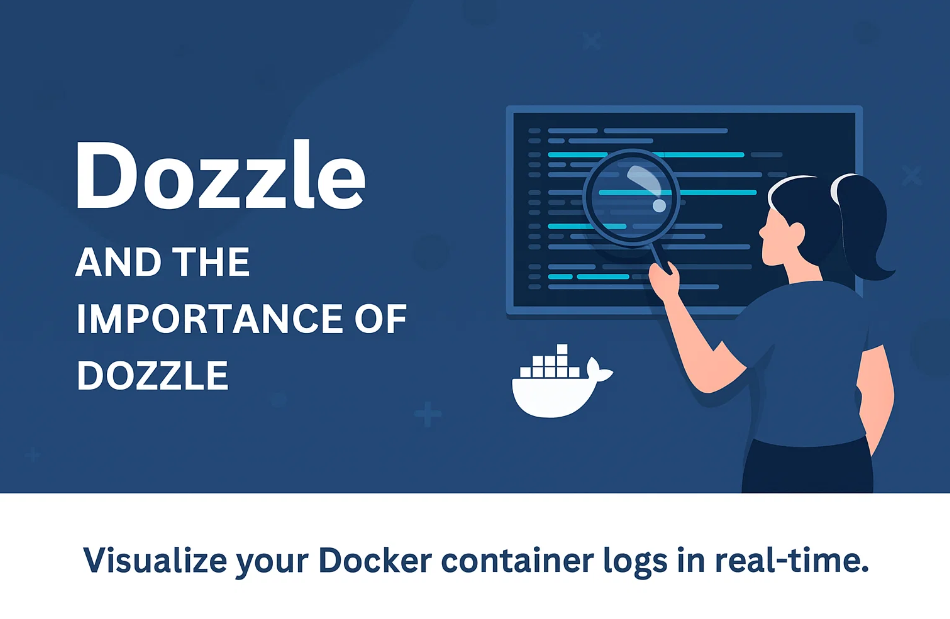Dozzle (at dozzle.dev) is a powerful, lightweight, web-based log viewer designed specifically for containerized environments—particularly Docker. Designed to simplify and streamline real-time log monitoring, Dozzle offers significant value to developers, DevOps professionals, and system administrators.

Dozzle is a lightweight, real-time log viewer for Docker containers. 🚀
Instead of running docker logs -f <container_id> manually for each container, Dozzle provides a web-based UI to view logs from all running containers in one place.
1. Real-Time Log Streaming in the Browser
Dozzle enables you to tail container logs live via a web UI—no terminal switching or manual Docker logs commands required
2. Self-Hosted & Privacy-Focused
You run it on your own infrastructure—logs stay within your environment, providing both privacy and control
3. Lightweight & Easy to Deploy
The application itself is compact (around 7 MB compressed), easy to install, and runs as a Docker container
4. Powerful Filtering & Searching
Dozzle offers fuzzy container-name search, regex support, and even SQL-based querying (via WebAssembly and DuckDB)—all from within the browser
5. Advanced Features for DevOps
- Shell access (browser-based terminal) lets you run commands directly inside containers—though disabled by default for security reasons.
- Multi-host support, secure agent mode, and Docker Swarm integration allow centralized log monitoring across different environments
6. Open Source & Actively Maintained
Dozzle is open source under the MIT license, sponsored by Docker OSS, and actively updated by its maintainer, Amir Raminfar
| Feature | Description |
| Real-Time Logs | Stream logs live in your browser |
| Lightweight UI | Minimal resources, runs as a compact Docker container |
| Search & Filter | Fuzzy search, regex, SQL queries, multi-container views |
| Shell Access | Execute commands inside containers via browser (optional and disabled by default) |
| Multi-Host & Swarm | Monitor logs across hosts and Docker Swarm clusters |
| Security & Self-Hosting | Runs locally to keep logs private |
| Open Source & Maintained | MIT license, backed by Docker OSS, actively supported |
Key Features:
- 📜 Real-time streaming logs (like tail -f).
- 🔍 Search & filter logs per container.
- 🌗 Dark mode support.
- 🐳 Works directly with Docker, no database required.
- 🔐 Can be secured with reverse proxies & authentication.
- ⚡ Minimal resource usage, designed to be very fast.
How It Works:
- Dozzle runs as a Docker container.
- It connects to the Docker daemon socket (/var/run/docker.sock) to read container logs.
- Logs are then served via a web UI (default at http://localhost:8080).
Dozzle is free and open-source.
- It’s licensed under the MIT License, which means you can use, modify, and distribute it freely, even for commercial purposes.
- The source code is available on GitHub: amir20/dozzle.
- The official Docker image (amir20/dozzle) is also publicly available on Docker Hub.
Here’s a mix of free/open-source and enterprise-grade alternatives to Dozzle for Docker log viewing and container log management:
🔹 Free & Open Source Alternatives
- Portainer
- Docker & Kubernetes management UI.
- Includes container log viewing (not as real-time/lightweight as Dozzle).
- Great if you also want container lifecycle management.
- Loki + Grafana
- Loki (log aggregation system by Grafana Labs) + Grafana (visualization).
- Can ingest container logs at scale.
- More powerful for historical analysis, metrics + logs correlation.
- Fluent Bit / Fluentd
- Lightweight log collectors.
- Forward logs to destinations (Elasticsearch, Loki, Splunk, etc.).
- Good if you want central log pipelines.
- Logspout
- Routes Docker container logs to external services.
- Not a viewer itself, but good for centralized logging.
- Glances (with Docker support)
- Real-time system monitoring tool with logs and container insights.
- More for system health and metrics than just logs.
🔹 Enterprise-Grade / Commercial Solutions
- Datadog
- Full observability (logs, metrics, traces).
- Docker & Kubernetes integrations.
- Paid SaaS, but very powerful for distributed systems.
- ELK / OpenSearch Stack (Elasticsearch, Logstash, Kibana)
- Enterprise-level logging and analytics.
- Scalable, supports log search, dashboards, alerting.
- Open source, but heavy to set up (often used in enterprises).
- Splunk
- Enterprise log management & SIEM solution.
- Expensive but used widely in large organizations.
- Sumo Logic
- Cloud-based log aggregation & analytics.
- Good for large-scale monitoring, with AI/ML-driven insights.
- Graylog
- Centralized log management platform.
- Open-source core, enterprise features in paid edition.
- Good balance between OSS and enterprise.



